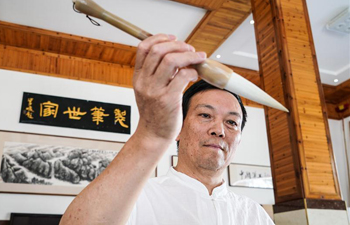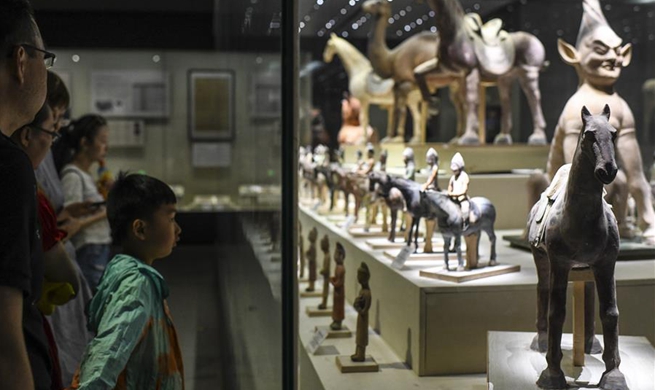by Olatunji Saliu
ABUJA, Aug. 9 (Xinhua) -- One evening in March 2018, Ebenezer Onyedika, a fresh Nigerian graduate was having an evening walk when a text message popped up on the WhatsApp Messenger on his phone.
The message, forwarded to him by a friend, was the link to a website through which Onyedika could apply for a Chinese scholarship. He ignored the message.
Two days later, a relative of his, again, called to inform him about the opportunity of studying in China.
Then, Onyedika realized the message, sent by the Federal Scholarship Board, an agency under the federal ministry of education which offers the Bilateral Educational Agreement (BEA) scholarship awards for undergraduate, Masters, and Ph.D. students to study overseas, was a genuine one.
"I wasn't sure how to go about the application after I opened the link. Then I got another call from a relative directing me on how to go about it. This made me realize that this was serious and then I picked interest in it and followed up," he said.
Beyond his imagination, Onyedika's application was successful after a thorough screening which included a physical examination for all candidates.
He is one of 58 Nigerian students who got the 2019 Chinese government scholarship to study at various universities in China.
This batch of students who on Wednesday got a pre-departure orientation at the Chinese embassy in Abuja, Nigeria's capital, comprises of three undergraduates, 39 Masters students, and 16 doctorate degree students.
The scholarship beneficiaries will begin to leave the shores of Nigeria on August 30 or early September, to pursue their dreams. Some of them will be away for five years.
The scholarship is fully sponsored by the Chinese government through different programs, such as the Chinese unilateral grants to developing countries, China-Nigeria bilateral agreements and multilateral outcomes such as the 2018 Beijing summit of Forum On China-Africa Cooperation (FOCAC).
For Onyedika and most of the scholarship beneficiaries, who said they couldn't have been able to afford their study expenses overseas, the scholarship opportunity brings a ray of hope to them, as they can now achieve their dreams in life and getting high quality of education in China.
"I plan to study chemical engineering in China, for my Masters. I will be in China for two years, at the Wuhan University of Technology," said the 26-year-old who bagged a B.Sc in Biochemistry at a local university over a year ago. "In studying chemical engineering and life science in China, my dream is to help solve world problems with pollution and everything. This is my dream: to come back to Nigeria and applying all that I have learned here."
"China is a place to go to achieve whatever you plan to achieve. When you have a dream to move forward, you can achieve anything you want in China," he enthused.
As China and Nigeria seek to continue enhancing educational exchanges and cooperation, the scholarship opportunity is not only a demonstration of the close people-to-people exchanges between the two countries but also a great inspiration for deepening the bilateral exchange and cooperation in the educational field in the future.
In an environment of different language, culture and life in China, the scholarship beneficiaries hope they will overcome any difficulties and challenges with courage, make full use of time, acquire professional knowledge, and strive for excellent results so as to live up to the expectations of their families and country.
Tamara Otonoku, one of the scholarship beneficiaries, who will also undergo a three-year Masters program in Environmental Science and Engineering at a Chinese university, said that "China is open to a lot of cultures."
"I am happy that I have this opportunity so that I can learn about the way of life of the Chinese and more. And when I come back to Nigeria, I can put in all that I have learned in the sector that I find myself," Otonoku said, adding she looks forward to seeing the very best of her life experience during her stay in China.
"I hope to meet new people, learn the Chinese language, experience their culture and their food," she said.
Yusuf Buba, another beneficiary, said apart from learning, he has a plan to visit places in China, read hard, work hard, give his very best and represent Nigeria well on the foreign soil.
Buba also thanked the Chinese and Nigerian governments for their cooperation in many ways and giving him and many other young citizens "this lifetime opportunity".
Every year, hundreds of Nigerian students get scholarships and chase their dreams in China. As of May, a total of 512 Nigerian students had benefited from the Chinese government scholarships, according to the Chinese embassy in Abuja.
A large proportion of the Chinese government-supported students are in China for their Masters and doctorate degrees in engineering, medicine, agriculture, and other majors which Nigeria most urgently needs.
At the pre-departure ceremony held by the Chinese embassy, a documentary titled "China Beyond Imagination" was aired to the beneficiaries, introducing them to life in the most populous country in the world, its people, culture and the opportunities of a brighter, rewarding future.
Li Xuda, the Chinese cultural counselor in Nigeria, enjoined the scholarship awardees to make full use of their time in China and acquire more skills and knowledge which will be used to build a beautiful Nigeria when they return home.
"I have full confidence that you will become a model for China-Africa cooperation in the future," Li added.













